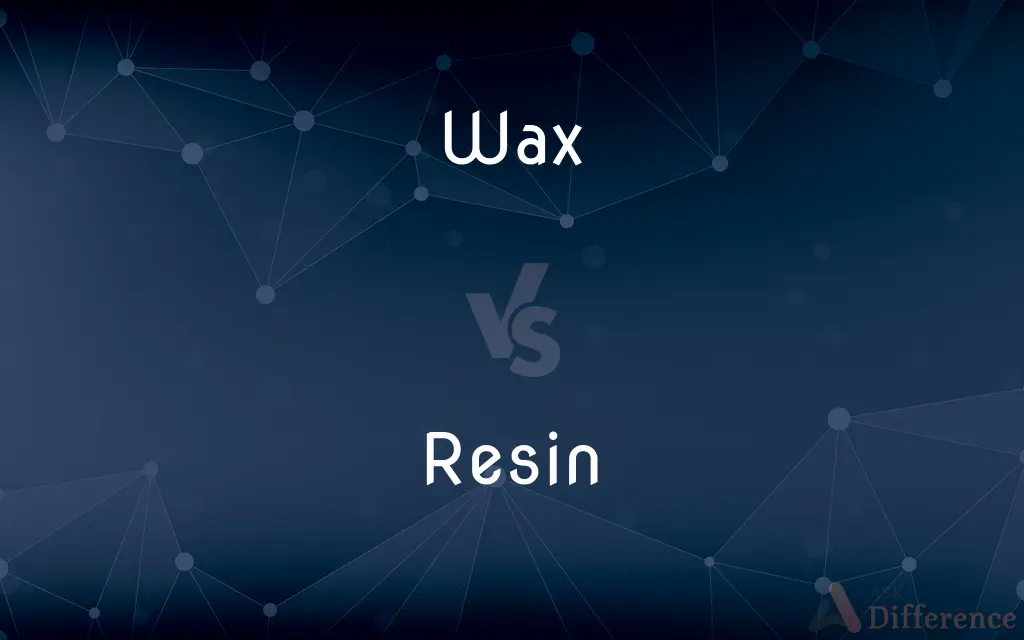Wax vs. Resin — What's the Difference?
By Tayyaba Rehman & Maham Liaqat — Updated on March 25, 2024
Wax is primarily organic and used for coatings and candles, whereas resin is a sticky substance from plants or synthetics used in plastics and varnishes.

Difference Between Wax and Resin
Table of Contents
ADVERTISEMENT
Key Differences
Wax, a substance primarily derived from organic sources like plants and animals, is notable for its use in creating candles and coatings. It is malleable at room temperature and melts easily. On the other hand, resin, which can be either natural or synthetic, is a sticky substance often used in the production of plastics, varnishes, and adhesives. Its versatility stems from its chemical composition, which allows it to harden into a solid form.
Wax is celebrated for its natural protective qualities, offering waterproofing and polish, especially in the automotive and furniture industries. Whereas resin is utilized for its binding properties and durability, making it essential in manufacturing, art, and construction for creating strong, cohesive surfaces and structures.
In terms of environmental impact, natural waxes like beeswax and soy wax are considered biodegradable and eco-friendly. However, resins, especially synthetic ones, can be less environmentally friendly due to their chemical compositions and longer decomposition times.
When it comes to artistic and creative applications, wax is often used in encaustic painting and candle making due to its pliable and aesthetic qualities. Resin, on the other hand, is favored in jewelry making, crafting, and as a finish for artworks and furniture due to its clear, durable finish.
The production process of wax involves the purification and refinement of organic materials, leading to a variety of types such as paraffin, beeswax, and soy wax, each with its own specific applications. Resin production, however, can involve the collection and processing of natural sap or the chemical synthesis of materials for creating polymers, each type designed for specific uses and properties.
ADVERTISEMENT
Comparison Chart
Source
Organic (plants, animals)
Natural (plant sap) or synthetic
Main Uses
Candles, coatings, polishes
Plastics, varnishes, adhesives
Physical State
Solid at room temperature, melts easily
Sticky liquid, hardens to solid
Environmental
Biodegradable, eco-friendly (natural types)
Less eco-friendly (especially synthetic)
Applications
Candle making, encaustic painting
Jewelry making, crafting, surface finishing
Compare with Definitions
Wax
Wax is an organic substance derived from plants and animals, used for candles and sealing.
Beeswax candles are popular for their natural aroma.
Resin
Once hardened, resin provides a durable, resistant finish.
Resin coatings protect wood tables from scratches.
Wax
Natural waxes are biodegradable and considered eco-friendly.
Using beeswax wraps is an environmentally friendly alternative to plastic.
Resin
Known for its strong adhesive and binding properties.
Resin is used to bind composite materials in construction.
Wax
Exists in various forms like paraffin, beeswax, and soy wax, each with specific uses.
Soy wax is preferred for making eco-friendly candles.
Resin
Synthetic resins pose environmental concerns due to their chemical makeup.
Disposing of resin products improperly can harm the environment.
Wax
Wax serves as a protective coating, offering shine and waterproofing.
Waxing a car protects its paint from dirt and water.
Resin
Resin can be natural or synthetic, used in plastics and adhesives.
Epoxy resin is used in creating durable surfaces.
Wax
Has a lower melting point, making it ideal for applications requiring remolding.
Sealing wax melts easily to secure envelopes.
Resin
Used in a variety of applications from jewelry making to automotive.
Resin jewelry captures intricate details and colors.
Wax
Waxes are a diverse class of organic compounds that are lipophilic, malleable solids near ambient temperatures. They include higher alkanes and lipids, typically with melting points above about 40 °C (104 °F), melting to give low viscosity liquids.
Resin
In polymer chemistry and materials science, resin is a solid or highly viscous substance of plant or synthetic origin that is typically convertible into polymers. Resins are usually mixtures of organic compounds.
Wax
A sticky yellowish mouldable substance secreted by honeybees as the material of a honeycomb; beeswax.
Resin
A sticky flammable organic substance, insoluble in water, exuded by some trees and other plants (notably fir and pine)
Clear resin had oozed to the surface, trickled down, and set
Wax
Used in reference to records
He didn't get on wax until 1959
Resin
A solid or liquid synthetic organic polymer used as the basis of plastics, adhesives, varnishes, or other products
Epoxy resins frequently cause dermatitis
The chassis is constructed of synthetic resin
Wax
A fit of anger
She is in a wax about the delay to the wedding
Resin
Rub or treat with resin
Resined canvas
Wax
Cover or treat (something) with wax or a similar substance, typically to polish or protect it
I washed and waxed the floor
Resin
Any of numerous clear to translucent yellow or brown, solid or semisolid, viscous substances of plant origin, such as copal, rosin, and amber, used principally in lacquers, varnishes, inks, adhesives, plastics, and pharmaceuticals. Resins are usually insoluble in water.
Wax
Make a recording of
He waxed a series of tracks that emphasized his lead guitar work
Resin
Any of numerous physically similar polymerized synthetics or chemically modified natural resins including thermoplastic materials such as polyvinyl, polystyrene, and polyethylene and thermosetting materials such as polyesters, epoxies, and silicones that are used with fillers, stabilizers, pigments, and other components to form plastics.
Wax
(of the moon between new and full) have a progressively larger part of its visible surface illuminated, increasing its apparent size.
Resin
To treat or rub with resin.
Wax
Begin to speak or write about something in the specified manner
They waxed lyrical about the old days
Resin
A viscous hydrocarbon secretion of many plants, particularly coniferous trees.
Wax
Any of various natural, oily or greasy heat-sensitive substances, consisting of hydrocarbons or esters of fatty acids that are insoluble in water but soluble in nonpolar organic solvents.
Resin
Any of various yellowish viscous liquids or soft solids of plant origin; used in lacquers, varnishes and many other applications; chemically they are mostly hydrocarbons, often polycyclic.
Wax
Beeswax.
Resin
Any synthetic compound of similar properties.
Wax
Earwax.
Resin
(transitive) To apply resin to.
Wax
A solid plastic or pliable liquid substance, such as ozocerite or paraffin, originating from petroleum and found in rock layers and used in paper coating, as insulation, in crayons, and often in medicinal preparations.
Resin
Any one of a class of yellowish brown solid inflammable substances, of vegetable origin, which are nonconductors of electricity, have a vitreous fracture, and are soluble in ether, alcohol, and essential oils, but not in water; specif., pine resin (see Rosin).
Wax
A preparation containing wax used for polishing floors and other surfaces.
Resin
Any of various polymeric substance resembling the natural resins[1], prepared synthetically; - they are used, especially in particulate form, in research and industry for their property of specifically absorbing or adsorbing substances of particular types; they are especially useful in separation processes such as chromatography; as, an ion-exchange resin.
Wax
A resinous mixture used by shoemakers to rub on thread.
Resin
Any of a class of solid or semisolid viscous substances obtained either as exudations from certain plants or prepared by polymerization of simple molecules
Wax
A cosmetic procedure in which facial or body hair is removed by peeling away a layer of wax that has been allowed to harden.
Wax
A fit of anger
"All at once you would suddenly find yourself reverting to childish attitudes, flaring up in a wax with some fellow" (Frank O'Connor).
Wax
Made of wax
A wax candle.
Wax
To coat, treat, or polish with wax.
Wax
To remove (facial or body hair) by covering the skin with a layer of wax that is peeled off after hardening, uprooting the encased hairs.
Wax
To remove hair from (a portion of the body) by this method.
Wax
To increase gradually in size, number, strength, or intensity
“His love affair with Mrs. Bernstein waxed and waned and waxed again” (C. Hugh Holman).
Wax
To show a progressively larger illuminated area, as the moon does in passing from new to full.
Wax
To grow or become as specified
“His very body had waxed old in lowly service of the Lord” (James Joyce).
Wax
To speak or write as specified
“[He] warmed to his most favorite of subjects, waxed eloquent, gained in his face a glow of passion” (Paul J. Willis).
Wax
Beeswax.
Wax
Earwax.
What role does the wax in your earhole fulfill?
Wax
Any oily, water-resistant, solid or semisolid substance; normally long-chain hydrocarbons, alcohols or esters.
Wax
Any preparation containing wax, used as a polish.
Wax
The phonograph record format for music.
Wax
A thick syrup made by boiling down the sap of the sugar maple and then cooling it.
Wax
A type of drugs with as main ingredients weed oil and butane; hash oil.
Wax
(rare) The process of growing.
Wax
An outburst of anger, a loss of temper, a fit of rage.
Wax
Made of wax.
Wax
(transitive) To apply wax to (something, such as a shoe, a floor, a car, or an apple), usually to make it shiny.
Wax
(transitive) To remove hair at the roots from (a part of the body) by coating the skin with a film of wax that is then pulled away sharply.
Wax
To defeat utterly.
Wax
To record.
Wax
To increasingly assume the specified characteristic.
To wax eloquent
Wax
To grow.
Wax
To appear larger each night as a progression from a new moon to a full moon.
Wax
To move from low tide to high tide.
Wax
To increase in size; to grow bigger; to become larger or fuller; - opposed to wane.
The waxing and the waning of the moon.
Truth's treasures . . . never shall wax ne wane.
Wax
To pass from one state to another; to become; to grow; as, to wax strong; to wax warmer or colder; to wax feeble; to wax old; to wax worse and worse.
Your clothes are not waxen old upon you.
Where young Adonis oft reposes,Waxing well of his deep wound.
Wax
To smear or rub with wax; to treat with wax; as, to wax a thread or a table.
Wax
A fatty, solid substance, produced by bees, and employed by them in the construction of their comb; - usually called beeswax. It is first excreted, from a row of pouches along their sides, in the form of scales, which, being masticated and mixed with saliva, become whitened and tenacious. Its natural color is pale or dull yellow.
Wax
Hence, any substance resembling beeswax in consistency or appearance.
Wax
Cerumen, or earwax.
Wax
A waxlike composition used for uniting surfaces, for excluding air, and for other purposes; as, sealing wax, grafting wax, etching wax, etc.
Wax
A waxlike composition used by shoemakers for rubbing their thread.
Wax
A substance similar to beeswax, secreted by several species of scale insects, as the Chinese wax. See Wax insect, below.
Wax
A waxlike product secreted by certain plants. See Vegetable wax, under Vegetable.
Wax
A substance, somewhat resembling wax, found in connection with certain deposits of rock salt and coal; - called also mineral wax, and ozocerite.
Wax
Thick sirup made by boiling down the sap of the sugar maple, and then cooling.
Wax
Any of numerous substances or mixtures composed predominantly of the longer-chain saturated hydrocarbons such as the paraffins, which are solid at room teperature, or their alcohol, carboxylic acid, or ester derivatives.
Wax
Any of various substances of either mineral origin or plant or animal origin; they are solid at normal temperatures and insoluble in water
Wax
Cover with wax;
Wax the car
Wax
Go up or advance;
Sales were climbing after prices were lowered
Wax
Increase in phase;
The moon is waxing
Common Curiosities
Can both wax and resin be natural?
Yes, both can be natural; wax is derived from organic sources, and resin can come from plant sap.
Can resin be used in candle making like wax?
Resin is not typically used for candle making; it's more for creating durable, solid finishes and crafts.
What is the main difference between wax and resin?
Wax is an organic substance used for candles and coatings, while resin is a plant or synthetic-based sticky substance used in plastics and varnishes.
What are the uses of resin in art?
Resin is used in jewelry making, crafting, and as a finish for artworks and furniture for its clear and durable qualities.
Are wax and resin environmentally friendly?
Natural waxes are generally eco-friendly, whereas synthetic resins can be less so due to their chemical components.
How does the environmental impact of wax compare to resin?
Wax, especially when natural, has a lower environmental impact compared to synthetic resins.
Is wax biodegradable?
Yes, natural waxes like beeswax and soy wax are biodegradable.
What makes wax a popular choice for cosmetics?
Its natural composition and soft texture make it ideal for lip balms and creams.
Is it possible to mix wax and resin in applications?
While not common, certain artistic and industrial applications may utilize both for their unique properties.
How do the melting points of wax and resin compare?
Wax generally has a lower melting point, making it easier to mold and shape compared to resin which hardens more permanently.
What is a common use of wax in everyday life?
A common use is in candle making and as a protective coating for cars and furniture.
Why is resin preferred over wax for jewelry making?
Resin's durability and ability to encapsulate objects make it ideal for jewelry.
Can both wax and resin be used in the automotive industry?
Yes, wax for protective coatings and polish, and resin for parts and adhesives.
Can the durability of resin make it a better choice for outdoor applications compared to wax?
Yes, resin's durability and resistance to elements make it suitable for outdoor uses, where wax might not hold up as well.
Are there synthetic versions of both wax and resin?
Yes, there are synthetic varieties of both, used in various industrial applications.
Share Your Discovery

Previous Comparison
Prat vs. Sprat
Next Comparison
Deindividuation vs. ConformityAuthor Spotlight
Written by
Tayyaba RehmanTayyaba Rehman is a distinguished writer, currently serving as a primary contributor to askdifference.com. As a researcher in semantics and etymology, Tayyaba's passion for the complexity of languages and their distinctions has found a perfect home on the platform. Tayyaba delves into the intricacies of language, distinguishing between commonly confused words and phrases, thereby providing clarity for readers worldwide.
Co-written by
Maham Liaqat













































